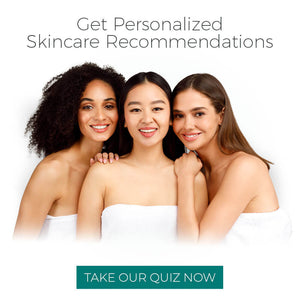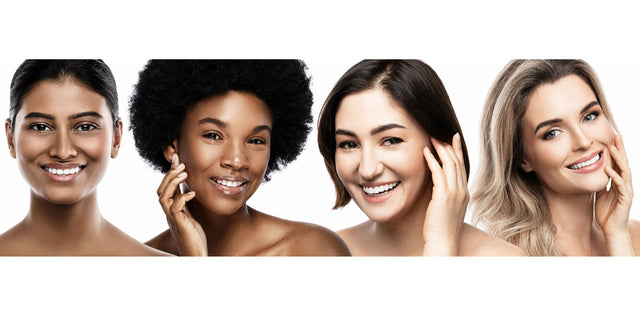Sometimes we wake up, look in the mirror and there it is – acne under chin. It’s not uncommon for people to develop acne in the chin area, but it can be quite overwhelming to manage this problem. For some people, it seems like every strategy turns into a failure. Sure, chin acne is a stressful skin concern, but you can overcome it - read on to learn how.
What is Chin Acne?
Chin acne is pimples, blackheads, whiteheads, and other blemishes that develop on the chin area. Acne is a common skin condition that occurs when hair follicles become clogged with sebum (oil) and dead skin cells. It is estimated that 9.4% of the global population has acne, meaning it’s the eighth most common disease in the world. Although adolescents often experience acne, older individuals can too. In fact, acne under chin is a common problem among adults.
Types of Chin Acne
Not all acne under chin or on your chin looks the same. Different types of chin acne are listed below.
1. Fungal acne
Fungal acne, or pityrosporum folliculitis, results from the accumulation of yeast in hair follicles. Although called fungal acne, it’s not acne per se. Fungal acne appears as red and itchy pimple-like bumps.
2. Cystic Acne
Cystic acne is one of the most painful and severe types of acne. This type of inflammatory acne causes the formation of pus-filled pimples deep under the skin. A cystic acne chin breakout can be quite stubborn and complex to manage because it may cause scarring.
3. Hormonal acne
As its name suggests, hormonal acne is associated with fluctuations in hormones. The hormonal fluctuations occur in puberty, during menopause, menstruation, and pregnancy, or may be due to hormonal disorders. Whiteheads on your chin, for example, could be linked to hormone changes.
4. Nodular acne
Nodular acne is severe acne that appears as hard and painful lumps located deep in the skin. More precisely, this type of acne presents itself as a pimple on the surface of your skin and as a pus-filled nodule under the skin. Sometimes this acne causes scarring.
If acne on your chin and other areas is persistent, you may want to see a dermatologist. They will be able to answer questions such as “What does acne on cheeks mean?” or tell you the possible causes of acne on your chin. This will help you manage the skin problem.
What are the Causes of Chin Acne?
The development of nodular acne and other types of acne has a lot to do with your genetic predisposition, lifestyle, hormones, and even the foods you eat.
Chin acne causes are listed below:
-
Stress: studies show[1] that the severity of stress is associated with an increase in the severity of acne. Stress triggers or worsens your acne under chin through higher levels of the hormone cortisol. Hormonal fluctuations caused by stress can increase inflammation and the production of sebum, which may also make the condition worse.
-
PCOS: polycystic ovary syndrome is associated with several dermatological manifestations including acne[2], seborrheic dermatitis, and androgenetic alopecia. Like some other chin acne causes, it is due to hormonal imbalances that increase sebum production thus making skin more susceptible to clogged pores.
-
Other hormone fluctuations: fluctuations in female estrogen hormones and male androgen hormones may cause or worsen a chin breakout due to excessive production of oil and clogged pores.
Prevention Tips for Chin Acne
While acne under chin can be bothersome, there’s a lot you can do to prevent this skin problem, including the following:
- Develop a good anti-acne skincare routine
- Wash your face twice a day
- Use an oil-free moisturizer
- Read labels and use non-comedogenic products that don’t clog pores
- Avoid touching your chin with your fingers
- Keep your phone clean
- Change pillowcases frequently
- Eat a healthy diet rich in fruits and vegetables
- Reduce or avoid refined carbohydrates and sugary or greasy foods
If you’re still wondering “What does acne on cheeks mean?” or want to know why you have it on your chin, consult a dermatologist who will be able to address your concerns.
Ways to Get Rid of Chin Acne
A chin breakout can take a toll on your confidence and self-esteem. However, as stubborn and frustrating as acne is, you can get rid of it successfully. Here are the most important treatment approaches:
1. OTC and prescription medications
Schedule an appointment to see a dermatologist. They will explain what to do about chin acne and address the question “What does acne on cheeks mean?”. You may need prescription medications such as Accutane (isotretinoin) and oral or topical antibiotics for your acne. Some people may also need topical benzoyl peroxide, which unclogs pores and treats acne[3].
Good OTC treatments for acne on your chin include the Zeroblem Blemish Treatment Serum, which deeply cleanses the skin and dissolves excess sebum. This powerful serum can heal acne and blemishes quickly and effectively.
2. Hormonal therapies
Since nodular acne and other types of acne tend to occur due to hormonal changes, you may need hormonal therapies. Some people may require antiandrogen medications like spironolactone to control oil production and manage acne.
3. Skincare routine
The crucial aspect in the treatment of acne under chin is a proper skincare routine. Your skincare regimen should include:
-
Cleansing: to get rid of excess oil and impurities that would clog pores. Facial washes like Rejuvoderm Clarifying Cleanser will cleanse the skin thoroughly and gently exfoliate to remove dead skin cells.
-
Moisturizing: to maintain hydration and prevent excessive dryness for a better skin barrier. Products like Infusoderm Deep Hydration Daily Moisturizer lower the risk of irritation, which could otherwise worsen acne. Additionally, this refreshing moisturizer revitalizes and nourishes the skin.
Home Remedies to Clear Chin Acne
In addition to the abovementioned treatment approaches, you can manage a chin breakout with the following home remedies:
-
Tea tree oil: exhibits antibacterial and anti-inflammatory properties that reduce mild to moderate acne[4]. Apply a small amount of diluted tea tree oil on both nodular acne and other types of acne.
-
Witch hazel: a natural astringent that tones the skin, reduces excess oil, and soothes inflammation.
-
Clay masks: e.g. bentonite or kaolin clay; absorb excess sebum, unclog pores, and reduce acne. Use them once or twice a week.
-
Aloe vera: helps treat acne thanks to its anti-inflammatory and soothing properties. This natural ingredient also promotes healing and skin repair.
What are the Risks of Having Acne under Chin?
As noted above, chin acne causes problems with confidence and self-esteem. When left unmanaged, it may become persistent and lead to significant emotional distress. People with severe acne may also develop acne scars or skin discolorations and long-term skin imperfections.
Don’t be afraid to ask your dermatologist “What does acne on cheeks mean?” or how to manage acne on and under your skin.
Frequently asked questions
What deficiency causes chin acne?
Deficiency in vitamin D could be one of many chin acne causes. The sunshine vitamin has antioxidant and anti-comedogenic effects and insufficient levels pave the way to the pathogenesis of acne.
What causes chin acne in men?
Causes of chin acne in men are higher levels of androgens, stress, poor skincare habits, and an unhealthy diet. Shaving and wearing sports equipment are also among the causes of chin acne in males. These factors lead to excessive production of oil and clogged pores.
Is chin acne stress acne?
Stress contributes to the formation of acne in the oiliest parts of the face, including the chin. However, it is not the only cause.
What hormones cause chin acne?
Chin acne is associated with a relative increase in levels of androgen hormones, such as testosterone. Higher levels of these hormones increase the production of oil and make pores susceptible to clogging.
Conclusion
Although acne under chin affects a person’s confidence, all is not lost. There’s a lot you can do to manage it and prevent future breakouts. Having a well-structured skincare routine with non-comedogenic products can certainly help you overcome this problem and enjoy healthier, more radiant skin.
References
1] ↑ https://www.ncbi.nlm.nih.gov/pmc/articles/PMC5903830/
2] ↑ https://www.ncbi.nlm.nih.gov/pmc/articles/PMC7053678/
3] ↑ https://pubmed.ncbi.nlm.nih.gov/32175593/
4] ↑ https://pubmed.ncbi.nlm.nih.gov/27000386/







